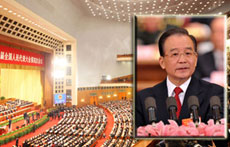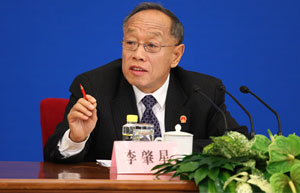'Tibet will be stable even if he passes away'
By Cui Jia (China Daily)
Updated: 2011-03-08 07:50
BEIJING - The Dalai Lama's death will not affect the Tibet autonomous region's overall situation but will likely have some minor impacts, a high-ranking official said on Monday.
"As a religious character, the Dalai Lama does have some influence over his believers," Qiangba Puncog, head of the standing committee of the autonomous region's people's congress and former chairman of Tibet, said at the annual session of the National People's Congress in Beijing.
| ||||
The 14th Dalai Lama fled to India and created the self-declared "Tibetan government-in-exile" after the central government foiled an armed rebellion he and supporters staged in 1959. The-76-year-old was blamed for fomenting the bloody riot on March 14, 2008, in the autonomous region's capital Lhasa that killed at least 18 people and injured 400.
"It's not that the anti-Chinese forces and the Dalai clique haven't thought of stirring up unrest in Tibet since the March 14 incident," Party chief of the autonomous region Zhang Qingli said.
"But the fact is that they haven't been able to do so because Tibetans know how precious peace is."
Zhang said the March 14 incident was the most personally upsetting experience he dealt with since he became Party chief nearly six years ago.
He also calls the Dalai Lama a "wolf in monk's robes" because he had done things beneath his status as a Living Buddha.
"I am extremely angry with the Dalai clique for kidnapping peace from us," Zhang said.
"I dare not say that Tibet will not see any incidents, big or small, ever again. But I dare say that the current situation in Tibet is generally stable, and the Tibetan people wish for stability and object to trouble-making."
Chairman of the autonomous region Padma Choling said many people have misconceptions about Tibet's realities after the March 14 riot.
"Some people think of Tibet as a troubled place, but they are wrong," he said.
"Actually, Tibet has always been stable and always will be. Some trivial incidents, such as the March 14 riot, are just isolated cases."
The Dalai Lama has said the institution of reincarnation might be abolished after his death. But his words should be disregarded, Padma Choling said.
He said Tibetan Buddhism's history spans more than 1,000 years, and the reincarnation institutions of the Dalai and Panchen lamas have continued for several hundred years.
"We must respect the historical institutions and religious rituals of Tibetan Buddhism. I am afraid it is not up to anyone to abolish the reincarnation institution," he said.
Zhang also explained why the government limits the number of foreigners allowed into the Tibet.
"In some rare cases and locations, the restrictions on foreign tourists to Tibet have been imposed due to concerns of Tibet's capacity to receive tourists and their safety," he said.
Tibet only has more than 1,000 hotels with 80,000 beds, so it is not feasible to allow everyone into Tibet during peak seasons, he added.







